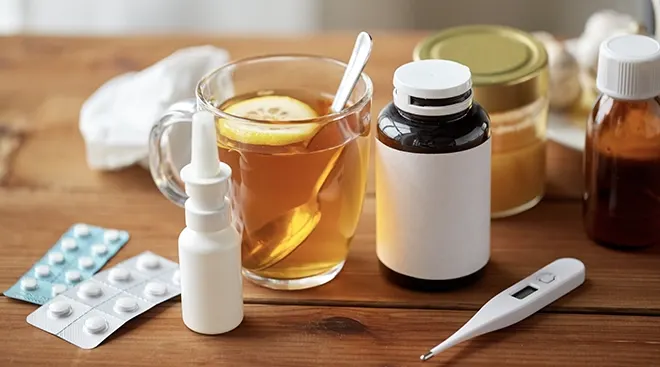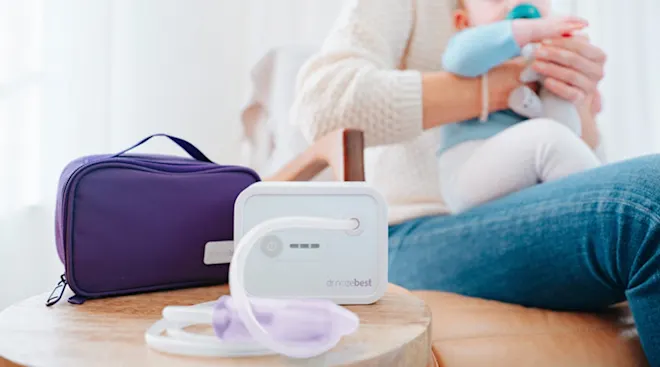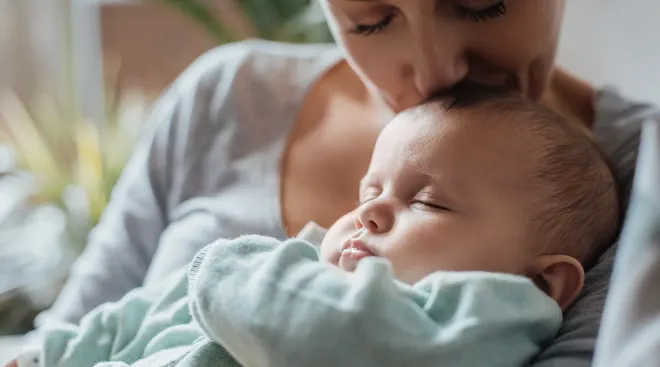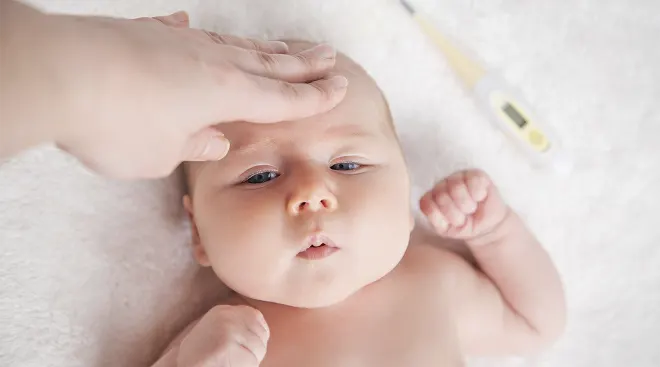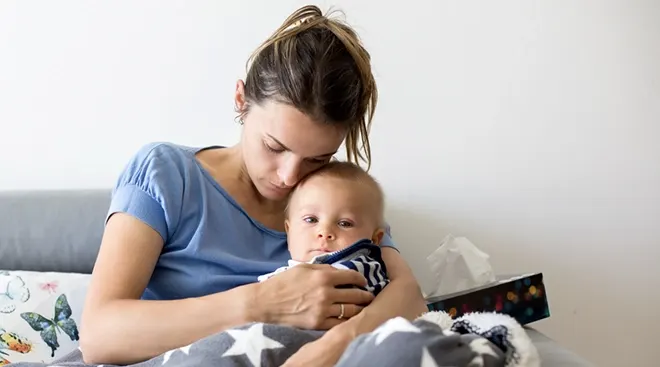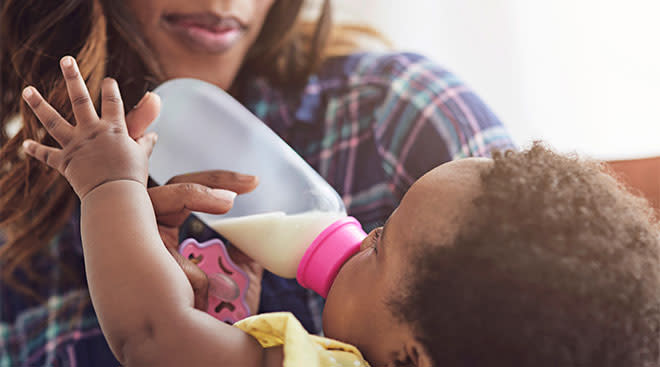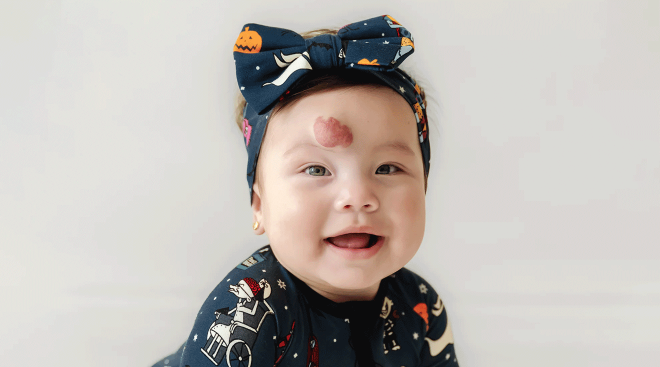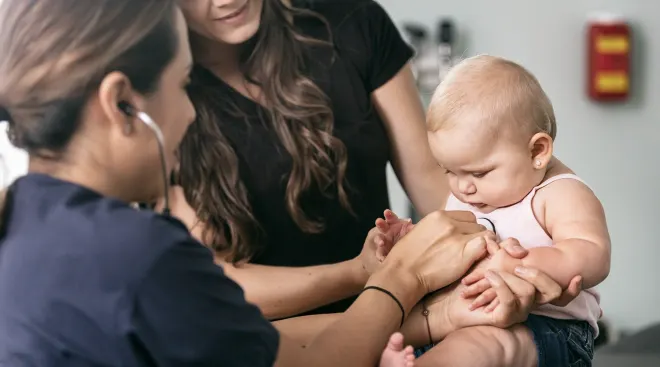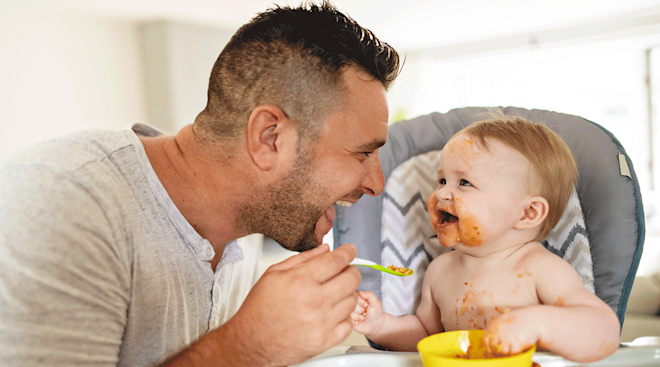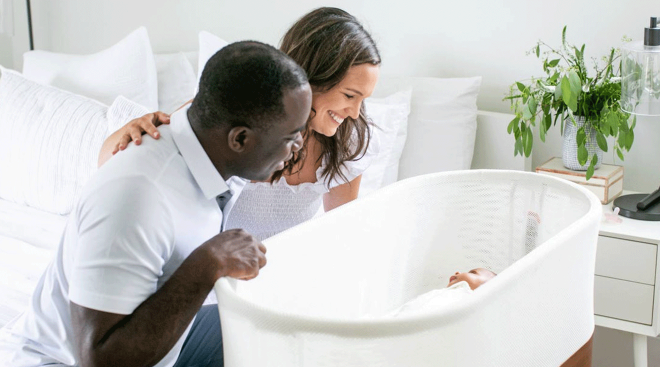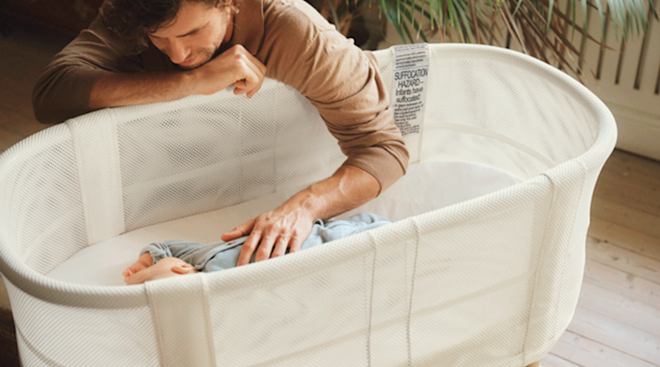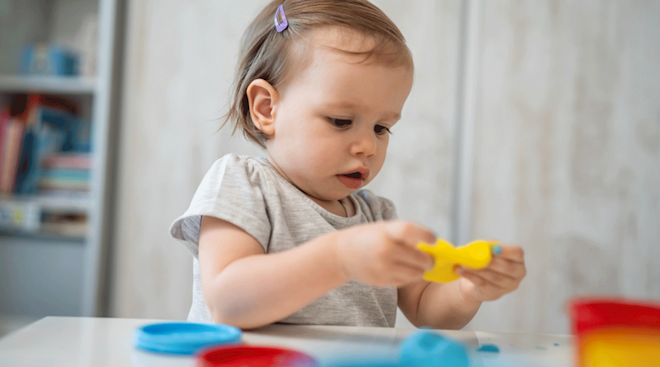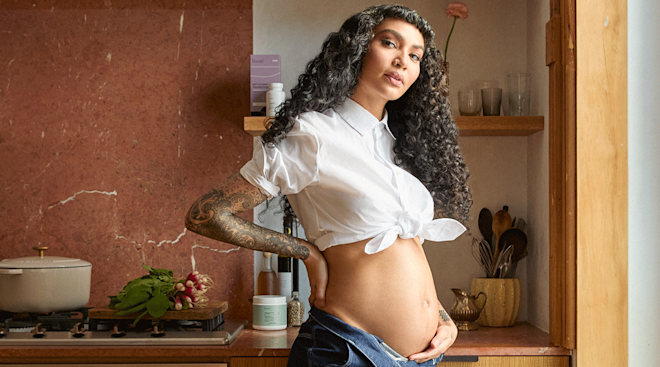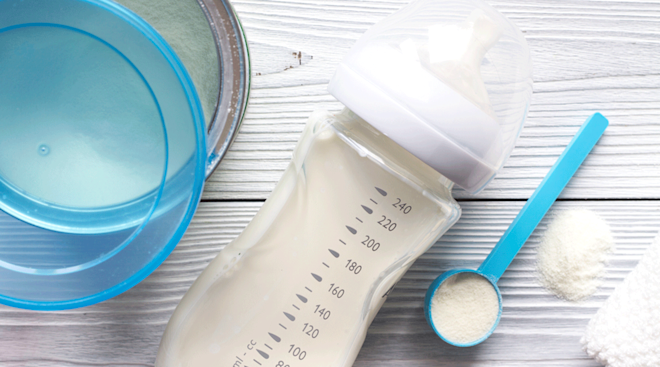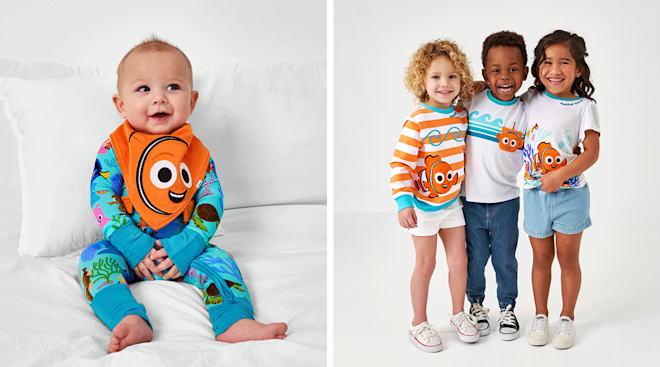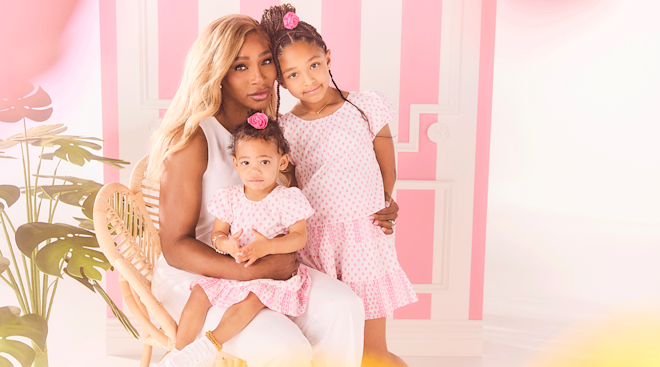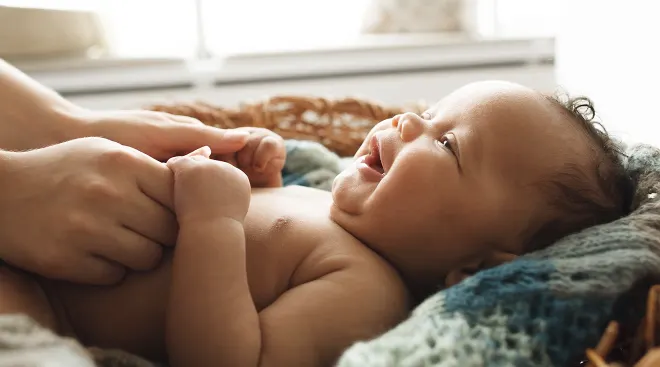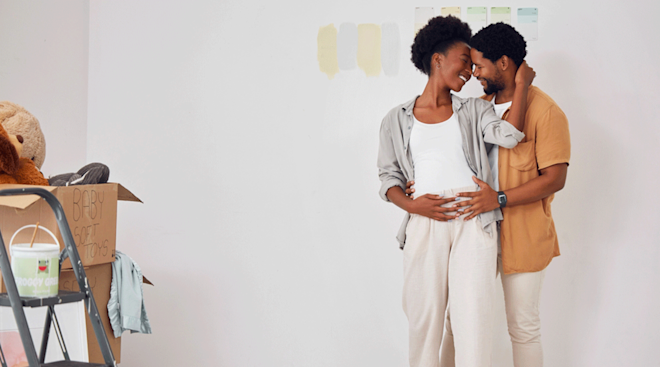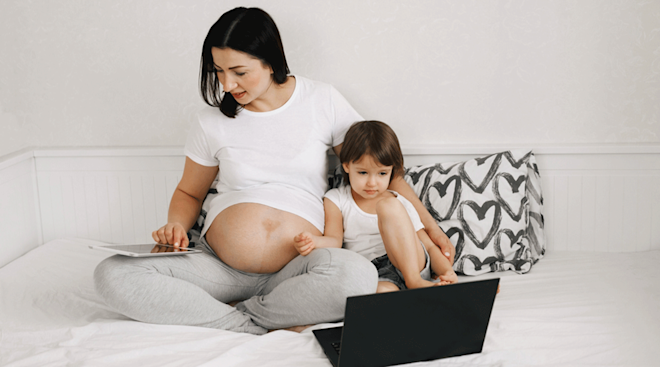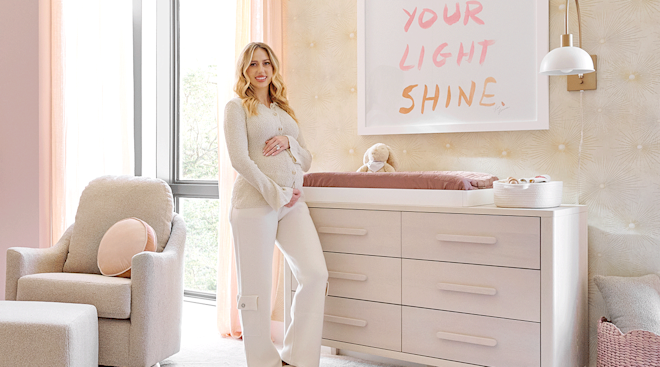Everything to Know About Newborn and Baby Congestion
As a new parent, you look forward to all the things your little one will learn to do: walking, talking and reading, just to name a few. But come cold and flu season, there’s another important skill that’s woefully underrated: knowing how to blow your nose. Once they’re older, this simple action will let your child breathe easy and manage colds like they’re no big deal. But for now, you’ve got to find safe and effective methods to help a congested baby get some relief. Luckily, there are plenty of ways you can deal with infant congestion. Here, pediatricians break down everything to know about congestion in babies and how to make a little one more comfortable.
Baby congestion occurs when a breathing airway is narrowed due to mucus buildup or inflammation, explains Krupa Playforth, MD, a pediatrician at Warm Heart Pediatrics in Northern Virginia and founder of The Pediatrician Mom. So, when dealing with a newborn stuffy nose, it means the nasal passages are partially blocked. “Because infants have smaller nasal passages to begin with, it doesn’t take as much to obstruct them—which is why baby congestion can be more challenging and more common than congestion in older children,” she adds. (And, FYI, if baby has baby chest congestion, it means the airways in the chest are narrowed and partially blocked.)
Several issues can lead to a congested baby. As mentioned, younger and premature babies have smaller air passages, and are more likely to have newborn congestion, Playforth says. But infant congestion typically occurs for two primary reasons: increased mucus production by the body and inflamed or swollen tissues surrounding the airways. The primary culprit overall? Viruses (i.e. including the cold or flu virus), says Gina Posner, MD, a pediatrician at MemorialCare Orange Coast Medical Center in Fountain Valley, California. Along with viruses, the body may also produce more mucus to help “trap and remove types of irritants,” in the nose, Playforth adds, such as allergens, pollutants, cigarette smoke, dry air or even a little bit of breast milk.
Congestion in babies is most prevalent when they’re prone to reflux and spitting up. “Sometimes that spit-up comes up so forcefully that it can eject from the nose and the mouth. The spit-up can irritate nasal passages and lead to inflammation,” Playforth says. Some parents also note their baby sounds congested but doesn’t have any mucus in their nose. So why might this be happening? Sometimes inflamed or narrow airways can sound like congestion in babies. “We frequently hear about this in newborns,” she adds.
Wondering if you have a congested baby on your hands? The signs of congestion in babies and adults are quite similar and include:
- Snoring. If baby is congested, you may notice more snoring, or they might have trouble drinking milk.
- Baby stuffy nose: A newborn stuffy nose occurs when the nasal passages are narrowed and blocked. “This can be a result of thick mucus, but sometimes is simply a result of that inflammation in the tissue surrounding the nasal passage, such as the sinuses, blood vessels, etc.,” Playforth explains.
- Runny nose: On the flipside, a runny nose—which occurs when there’s too much runny mucus—is also a sign of a congested newborn or baby, Playforth says.
- Coughing: Playforth notes that congestion usually causes a wet cough, and it may be worse when baby’s laying down due to postnasal drip. That said, she emphasizes that you should never elevate baby or their crib when dealing with a congested baby. “This is not a safe intervention because it can actually force baby’s airway to occlude,” she explains. “Babies should always be placed to sleep on their back on a flat surface.” (For more infant safe sleep practices, click here.)
It can be tough for any parent to watch their little one suffer from newborn and baby congestion. Fortunately, many treatments are quite effective at making baby more comfortable. Here are a few easy home remedies to help a congested baby:
- Breast milk: It doesn’t get more natural—or easier—than this. “A drop or two in the nose can help loosen congestion,” says Tanya Altmann, MD, FAAP, a Los Angeles–based pediatrician. “Let baby sniff it up, then give them tummy time; when baby lifts their head, it’ll drain out.” You can also drain the mucus by holding your congested baby upright.
- Nasal saline: As with breast milk, to clear baby’s nose add a drop or two in each nostril. You can buy nasal saline or make it at home: “Mix a quarter teaspoon of table salt and 8 ounces of bottled water,” Altmann says. (Tap water could introduce an infection, especially for a young infant.)
- Cool mist humidifier: Fill up the humidifier with plain water—no Vicks or other substances—and run it in baby’s room while they’re sleeping. “It really makes a difference,” Posner says.
- Steam room: “Steam up the bathroom and sit baby on your lap or breastfeed in there for 20 minutes,” Altmann says. “The humidity loosens any dry congestion in the nose to help it drain.”
- Nasal aspirator: When looking for how to get phlegm out of baby’s throat and nose, nasal aspirators can help. Instead of loosening the mucus, aspirators physically remove it (so it helps to apply saline or breast milk drops into the nose first to loosen things up). You probably already have a bulb suction, which is often part of the baby care package from the hospital. If you use one, make sure to replace the bulb every other month, since it’s impossible to clean the interior, advises Danelle Fisher, MD, a pediatrician with Providence Saint John’s Health Center in Santa Monica, California. A nasal aspirator that parents—and Playforth—swear by: the NoseFrida (aka, snot sucker), which unclogs a congested baby’s nose via a tube connected to a mouthpiece; parents place one end of the tube at the nostril and the other end in their mouth to suction out the mucus. (Don’t worry—the tube has a foam reservoir so the mucus can’t enter the parent’s mouth, and the device can be cleaned out periodically.) “It’s more effective—sometimes with a traditional bulb suction, it’s more challenging to remove the mucus and I find that there is an increased risk of irritating or traumatizing the nasal tissue,” Playforth says.
- Chamomile tea. This is another throat soother for older babies, the Children’s Hospital for the King’s Daughters in Virginia notes. But unlike with adults, don’t add honey if your child is under a year old; it can contain botulism spores that can only be destroyed by more mature stomachs.
While infant decongestant medicine might seem like an obvious go-to, it’s actually a major no-no. The FDA warns against using over-the-counter cough and cold medicines for children younger than 2 years old. In fact, many manufacturers have warning labels for kids younger than 4 years old. “Traditional cold and cough medicines can have unpleasant or dangerous side effects, and research shows they aren’t helpful,” Altmann says.
Is baby eating well? Is there any sign of fever or cough? If they seem otherwise happy, aside from the infant congestion, then just let your little one be and simply keep a close eye on them. “It’s usually safe to watch at home for a few days,” Fisher says. If baby’s congestion is interfering with their eating, sleeping and breathing abilities, however, then parents should intervene and remove the mucus, Playforth adds. Moreover, call your pediatrician if newborn congestion persists, or if your child starts to heat up with a fever, develops a cough or loses their appetite. Get immediate help if you see the following conditions:
- Breathing using stomach muscles
- Flared nostrils
- Quick breaths
- High-pitched wheezing
- Pale or blue skin
It’s tough to watch your little one helplessly suffer from baby congestion. Soon enough they’ll learn to blow that little nose. In the meantime, try to keep them as comfortable as possible.
Please note: The Bump and the materials and information it contains are not intended to, and do not constitute, medical or other health advice or diagnosis and should not be used as such. You should always consult with a qualified physician or health professional about your specific circumstances.
Plus, more from The Bump:
Krupa Playforth, MD, is a pediatrician at Warm Heart Pediatrics in Northern Virginia and founder of the Pediatrician Mom. She earned her medical degree from the Vanderbilt University School of Medicine and completed her residency at Georgetown University.
Tanya Altmann, MD, FAAP, is a Los Angeles–based pediatrician and a spokesperson for the American Academy of Pediatrics. In addition to founding Calabasas Pediatrics, she’s also an adjunct clinical professor at Children’s Hospital Los Angeles. Altmann has authored several books on children’s health and wellness. She earned her medical degree from Sackler School of Medicine in New York City.
Gina Posner, MD, is a board-certified pediatrician at MemorialCare Orange Coast Medical Center in Fountain Valley, California. She has spent more than a decade volunteering with a number of organizations in both the US and the Dominican Republic, educating both parents and children on topics of health. She earned her medical degree from New York Medical College and completed her residency at White Memorial Medical Center in Los Angeles, California.
Danelle Fisher, MD, is a pediatrician in Los Angeles, California and is affiliated with multiple hospitals in the area, including Providence St. John's Health Center. She received her medical degree from Albert Einstein College of Medicine of Yeshiva University.
US Food and Drug Administration (FDA), Should You Give Kids Medicine for Coughs and Colds?, January 2023
Boston Children’s Hospital, Cough, 2023
Children’s Hospital for the King’s Daughters, Home Remedies for Sick Kids, January 2023
Learn how we ensure the accuracy of our content through our editorial and medical review process.
Navigate forward to interact with the calendar and select a date. Press the question mark key to get the keyboard shortcuts for changing dates.

































